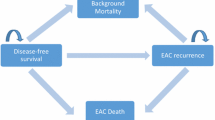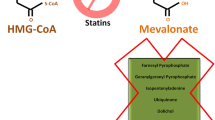Abstract
Purpose
Preclinical studies have shown that statins reduce proliferation in esophageal cancer. Three recent observational studies have shown encouraging results but suffered from limitations. This work aimed to assess at the Belgian population level whether statin usage was associated with a decreased mortality in esophageal cancer patients.
Methods
We conducted an observational, population-based study by linking data of the Belgian Cancer Registry (BCR) with medical claims data coming from health insurance companies and mortality records collected by regional governments for patients diagnosed with esophageal cancer between 2004 and 2014. Using time-dependent Cox regression models, hazard ratios (HRs) and 95% confidence intervals (CI) for overall and cancer-specific mortality were calculated.
Results
Of 6,238 patients with stage I-III esophageal cancer, post-diagnostic use of statins was found in 1,628 (26%) patients. Statins use after diagnosis was associated with a reduction in overall mortality (adjusted HR = 0.84, 95% CI [0.77; 0.92]) and cancer-specific mortality (adjusted HR = 0.87, 95% CI [0.78; 0.97]). Similar association were also seen for pre-diagnostic statin use in overall (adjusted HR = 0.83, 95% CI [0.76–0.91]) and cancer-specific analysis (adjusted HR = 0.86, 95% CI [0.77–0.96]).
Conclusions
In this large cohort of Belgian patients with esophageal cancer, statins use after diagnosis was associated with a decreased mortality.

Similar content being viewed by others
References
Fitzmaurice C, Allen C, Barber RM et al (2017) Global, regional, and national cancer incidence, mortality, years of life lost, years lived with disability, and disability-adjusted life-years for 32 cancer groups, 1990 to 2015: a systematic analysis for the global burden of disease study global burden. JAMA Oncol 3:524–548. https://doi.org/10.1001/jamaoncol.2016.5688
Lagergren J, Smyth E, Cunningham D et al (2017) Oesophageal cancer. Lancet 390:2383–2396. https://doi.org/10.1016/S0140-6736(17)31462-9
Coleman HG, Xie SH, Lagergren J (2018) The epidemiology of esophageal adenocarcinoma. Gastroenterology 154:390–405. https://doi.org/10.1053/j.gastro.2017.07.046
Rustgi AK, El-Serag HB (2014) Esophageal carcinoma. N Engl J Med 371:2499–2509. https://doi.org/10.1056/NEJMra1314530
Abnet CC, Arnold M, Wei WQ (2018) Epidemiology of esophageal squamous cell carcinoma. Gastroenterology 154:360–373. https://doi.org/10.1053/j.gastro.2017.08.023
Anderson LA, Tavilla A, Brenner H et al (2015) Survival for oesophageal, stomach and small intestine cancers in Europe 1999–2007: results from EUROCARE-5. Eur J Cancer 51:2144–2157. https://doi.org/10.1016/j.ejca.2015.07.026
Desai CS, Martin SS, Blumenthal RS (2014) Non-cardiovascular effects associated with statins. BMJ 349:1–10. https://doi.org/10.1136/bmj.g3743
Sirtori CR (2014) The pharmacology of statins. Pharmacol Res 88:3–11. https://doi.org/10.1016/j.phrs.2014.03.002
Catapano AL, Graham I, De Backer G et al (2016) ESC/EAS guidelines for the management of dyslipidaemias. Eur Heart J 37:2999–3058. https://doi.org/10.1093/eurheartj/ehw272
Sopková J, Vidomanová E, Strnádel J et al (2017) The role of statins as therapeutic agents in cancer. Gen Physiol Biophys 36:501–511. https://doi.org/10.4149/gpb_2017045
Ogunwobi OO, Beales ILP (2008) Statins inhibit proliferation and induce apoptosis in Barrett’s esophageal adenocarcinoma cells. Am J Gastroenterol 103:825–837. https://doi.org/10.1111/j.1572-0241.2007.01773.x
Sadaria MR, Reppert AE, Yu JA et al (2011) Statin therapy attenuates growth and malignant potential of human esophageal adenocarcinoma cells. J Thorac Cardiovasc Surg 142:1152–1160. https://doi.org/10.1016/j.jtcvs.2011.08.004
Shi J, Zhu J, Zhao H et al (2013) Mevalonate pathway is a therapeutic target in esophageal squamous cell carcinoma. Tumor Biol 34:429–435. https://doi.org/10.1007/s13277-012-0567-0
Konturek PC, Burnat G, Hahn EG (2007) Inhibition of Barrett’s adenocarcinoma cell growth by simvastatin: involvement of cox-2 and apoptosis-related proteins. J Physiol Pharmacol 58:141–148. http://www.jpp.krakow.pl
Alexandre L, Clark AB, Bhutta HY et al (2016) Association between statin use after diagnosis of esophageal cancer and survival: a population-based cohort study. Gastroenterology 150:854–65.e1. https://doi.org/10.1053/j.gastro.2015.12.039
Cardwell CR, Spence AD, Hughes CM et al (2017) Statin use after esophageal cancer diagnosis and survival: A population based cohort study. Cancer Epidemiol 48:124–130. https://doi.org/10.1016/j.canep.2017.04.015
Nguyen T, Khan A, Liu Y et al (2018) The association between statin use after diagnosis and mortality risk in patients with esophageal cancer: a retrospective cohort study of United States veterans. Am J Gastroenterol 113:1310–1318. https://doi.org/10.1038/s41395-018-0169-6
Lacroix O, Couttenier A, Vaes E et al (2018) Impact of metformin on gastric adenocarcinoma survival: a Belgian population based study. Cancer Epidemiol 53:149–155. https://doi.org/10.1016/j.canep.2018.02.001
Henau K, Van Eycken E, Silversmit G et al (2015) Regional variation in incidence for smoking and alcohol related cancers in Belgium. Cancer Epidemiol 39:55–65. https://doi.org/10.1016/j.canep.2014.10.009
Jegou D, Dubois C, Schillemans V et al (2018) Use of health insurance data to identify and quantify the prevalence of main comorbidities in lung cancer patients. Lung Cancer 125:238–244. https://doi.org/10.1016/j.lungcan.2018.10.002
Zhou Z, Rahme E, Abrahamowicz M et al (2005) Survival bias associated with time-to-treatment initiation in drug effectiveness evaluation: a comparison of methods. Am J Epidemiol. https://doi.org/10.1093/aje/kwi307 Published Online First
Mei Z, Liang M, Li L et al (2017) Effects of statins on cancer mortality and progression: A systematic review and meta-analysis of 95 cohorts including 1,111,407 individuals. Int J Cancer 140:1068–1081. https://doi.org/10.1002/ijc.30526
Nielsen SF, Nordestgaard BG, Bojesen SE (2012) Statin use and reduced cancer-related mortality. N Engl J Med 367:1792–1802. https://doi.org/10.1056/NEJMoa1201735
Gray RT, Coleman HG, Hughes C et al (2016) Statin use and survival in colorectal cancer: Results from a population-based cohort study and an updated systematic review and meta-analysis. Cancer Epidemiol 45:71–81. https://doi.org/10.1016/j.canep.2016.10.004
Kim ST, Kang JH, Lee J et al (2014) Simvastatin plus capecitabine-cisplatin versus placebo plus capecitabine-cisplatin in patients with previously untreated advanced gastric cancer: a double-blind randomised phase 3 study. Eur J Cancer 50:2822–2830. https://doi.org/10.1016/j.ejca.2014.08.005
Konings IRHM, Van Der Gaast A, Van Der Wijk LJ et al (2010) The addition of pravastatin to chemotherapy in advanced gastric carcinoma: a randomised phase II trial. Eur J Cancer 46:3200–3204. https://doi.org/10.1016/j.ejca.2010.07.036
Iannelli F, Lombardi R, Milone MR et al (2018) Targeting mevalonate pathway in cancer treatment: repurposing of statins. Recent Pat Anticancer Drug Discov 13:184–200. https://doi.org/10.2174/1574892812666171129141211
Brown JC, Meyerhardt JA (2016) Obesity and energy balance in GI cancer. J Clin Oncol 34:4217–4224. https://doi.org/10.1200/JCO.2016.66.8699
Hynes O, Anandavadivelan P, Gossage J et al (2017) The impact of pre- and post-operative weight loss and body mass index on prognosis in patients with oesophageal cancer. Eur J Surg Oncol 43:1559–1565. https://doi.org/10.1016/j.ejso.2017.05.023
Sun P, Chen C, Zhang F et al (2016) Combined heavy smoking and drinking predicts overall but not disease-free survival after curative resection of locoregional esophageal squamous cell carcinoma. Onco Targets Ther 9:4257–4264. https://doi.org/10.2147/OTT.S104182
Lennon H, Sperrin M, Badrick E et al (2016) The obesity paradox in cancer: a review. Curr Oncol Rep 18:56. https://doi.org/10.1007/s11912-016-0539-4
Lagergren J, Andersson G, Talbäck M et al (2016) Marital status, education, and income in relation to the risk of esophageal and gastric cancer by histological type and site. Cancer 122:207–212. https://doi.org/10.1002/cncr.29731
Emilsson L, García-Albéniz X, Logan RW et al (2018) Examining bias in studies of statin treatment and survival in patients with cancer. JAMA Oncol 4:63–70. https://doi.org/10.1001/jamaoncol.2017.2752
Targownik LE, Suissa S (2015) Understanding and avoiding immortal-time bias in gastrointestinal observational research. Am J Gastroenterol 110:1647–1650. https://doi.org/10.1038/ajg.2015.210
Acknowledgments
We thank for this publication the Belgian Cancer Registry collaborators who were involved in the data collection and the research team for their expertise. We also sincerely thank the Intermutualistic Agency IMA-AIM, the Belgian Crossroads bank for Social Security (BCSS) and the Belgian regions for providing the data that made this research possible.
Author information
Authors and Affiliations
Corresponding author
Additional information
Publisher’s Note
Springer Nature remains neutral with regard to jurisdictional claims in published maps and institutional affiliations.
Electronic supplementary material
Below is the link to the electronic supplementary material.
Rights and permissions
About this article
Cite this article
Lacroix, O., Couttenier, A., Vaes, E. et al. Statin use after diagnosis is associated with an increased survival in esophageal cancer patients: a Belgian population-based study. Cancer Causes Control 30, 385–393 (2019). https://doi.org/10.1007/s10552-019-01149-3
Received:
Accepted:
Published:
Issue Date:
DOI: https://doi.org/10.1007/s10552-019-01149-3




